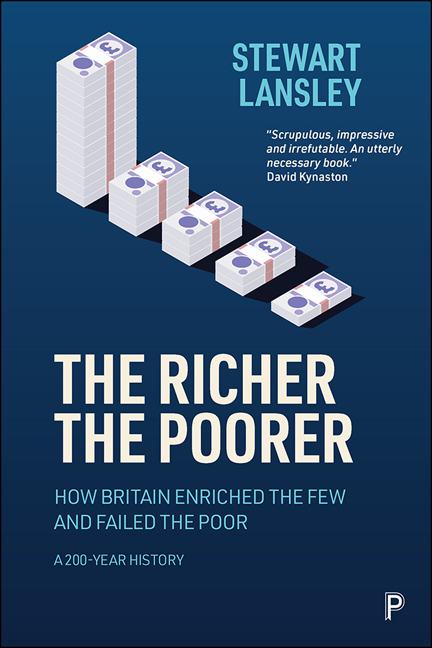Book contents
- Frontmatter
- Miscellaneous Frontmatter
- Dedication
- Epigraph
- Contents
- List of figures
- Preface and acknowledgements
- Introduction: Knighthoods for the rich, penalties for the poor
- PART I 1800–1939
- PART II 1940–59
- PART III 1960–79
- PART IV 1980–96
- PART V 1997–2010
- PART VI 2011–20
- Afterword: COVID-19 and ‘the polo season’
- Notes
- Index
Preface and acknowledgements
Published online by Cambridge University Press: 13 May 2022
- Frontmatter
- Miscellaneous Frontmatter
- Dedication
- Epigraph
- Contents
- List of figures
- Preface and acknowledgements
- Introduction: Knighthoods for the rich, penalties for the poor
- PART I 1800–1939
- PART II 1940–59
- PART III 1960–79
- PART IV 1980–96
- PART V 1997–2010
- PART VI 2011–20
- Afterword: COVID-19 and ‘the polo season’
- Notes
- Index
Summary
There are several studies which have chronicled, separately, the sweeping history of inequality, of wealth and of poverty. By telling the story of impoverishment and enrichment side by side, The Richer, The Poorer explores the extent to which the apparently separate fates of rich and poor have been critically linked. What impact, the book asks, has the process of personal enrichment by the few had on the livelihoods, life chances and incomes of the many? Has it been right for policymakers to treat poverty over most of this period as a largely distinct condition, independent of the structural forces that determine how the economic cake is sliced?
As with all books, this is the product of collaboration. I would like to thank the scores of families who have been willing to share their experiences of living on low-paid and insecure work and grappling with a complex and often coercive benefit system. Many of their testimonies, collected over different time periods, have been used as case studies in the post-1970s sections of the book. Each of them illustrate, in different ways, not just the constant struggle to get by but also the failures of policy over time.
A big thank you to co-researchers and the many students and friends from whom I have accumulated a mountain of debt over many years. A special thanks to Joanna Mack. We worked together on the two ITV Breadline Britain series shown in 1983 and 1990, co-authored Poor Britain in 1985 and Breadline Britain in 2015, which set out the methodology and findings of successive ‘consensual’ surveys on poverty, and helped develop the website Poverty.ac.uk. I would also like to thank the team behind the 2012 Poverty and Social Exclusion Study –the last and most in-depth of the four surveys –and especially its project lead, David Gordon. Thanks too to the Friends Provident Foundation for supporting a study on ways of giving all citizens an equal stake in the economy, and to my colleagues on the study, Duncan McCann and Steve Schifferes; and to the Joseph Rowntree Foundation for funding a study on the feasibility of a guaranteed income floor. A special thanks to Howard Reed –we have worked together on several projects –and to the think tank Compass, and its director Neal Lawson; and to colleagues on the council of the Progressive Economy Forum.
- Type
- Chapter
- Information
- The Richer, the PoorerHow Britain Enriched the Few and Failed the Poor: A 200-Year History, pp. xiv - xviiiPublisher: Bristol University PressPrint publication year: 2021



